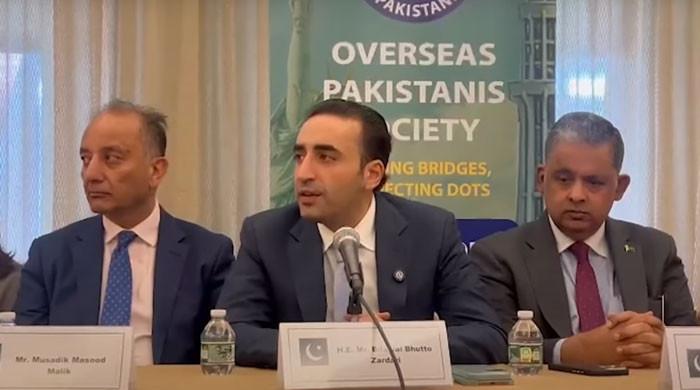Pakistan Exercised Restraint, Could Have Downed 20 Indian Jets, Says Bilawal
NEW YORK: Pakistan Peoples Party (PPP) Chairman Bilawal Bhutto Zardari stated that while Pakistan possessed the capability to shoot down twenty Indian aircraft, it opted for measured restraint, underscoring that the nation has consistently acted in self-defense.
Addressing members of the Pakistani diaspora in New York on Wednesday, the 36-year-old politician indicated that during the recent military tensions between the two nuclear powers, the Pakistan Air Force had “locked onto 20 Indian aircraft.” However, he emphasized that the Pakistani military leadership demonstrated responsibility, choosing to engage only the six Indian jets that violated Pakistani airspace and released their ordnance within the country.
“Pakistan responded with significant prudence as a responsible nuclear-armed state. We possessed the capacity to down 20 planes. However, the Pakistani air force showed restraint. The military command exhibited their rationality, and engaged only the six planes that dropped their payload on Pakistani territory,” he remarked.
He asserted that Pakistan harbored no aggressive intentions and acted purely in self-defense following the Indian incursion.
“Our strikes into India were initiated only after India launched missile strikes into Pakistani territory, as international law and the United Nations charter provides for our right to self-defence,” he emphasized.
“Regrettably, the globe is currently a less secure environment due to Indian actions in early May.”
The PPP chairman alleged that India’s military operation on May 7 deliberately targeted civilian infrastructure, encompassing places of worship, dams, and energy-related facilities. Pakistan maintains that these strikes resulted in the loss of innocent civilian lives, including women and children.
India has accused Pakistan of orchestrating a terrorist attack in Indian Illegally Occupied Jammu and Kashmir (IIOJK), an accusation vehemently refuted by the PPP chairman. He stated that Pakistan denounced the attack and offered to participate in an international investigation, an offer that New Delhi reportedly declined.
He criticized India for acting unilaterally without presenting evidence, stating, “India chose to be judge, jury and executioner.”
The former foreign minister cautioned against the severe dangers of escalation in South Asia, emphasizing that any future misjudgment could precipitate a nuclear conflict with worldwide repercussions.
Bilawal emphasized that a nuclear conflict carries implications for the entire world. Therefore, it is crucial for Pakistan to articulate its position, urging the global community to persist in its role, as it did during the ceasefire, and to persuade India to abandon its current approach and instead commit to an inclusive and comprehensive dialogue with Pakistan.
He voiced concerns regarding India’s alleged infringement of the Indus Waters Treaty and the suppression of the rights of Kashmiris.
He implored the international community, notably the United States, to assume a more proactive role in alleviating tensions and fostering dialogue.
“A war between India and Pakistan is not in anyone’s interest,” he concluded, advocating for a comprehensive peace initiative founded on diplomacy, mutual respect, and adherence to international law.



Comments (0)
No comments yet. Be the first to comment!
Leave a Comment